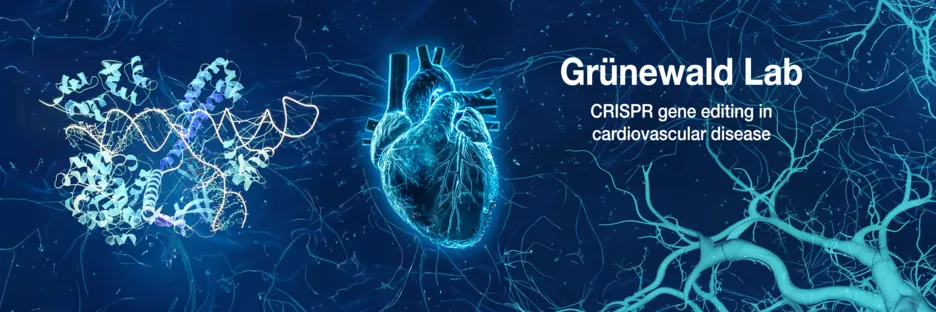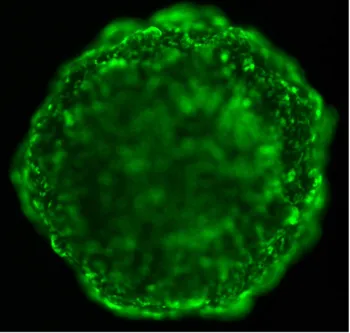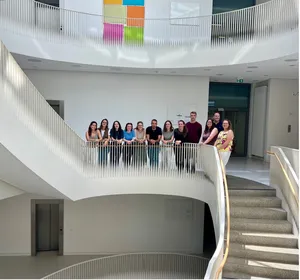
At the Grünewald Lab, we develop gene and cell therapies with a focus on CRISPR technologies. We use protein engineering and bespoke gene editing strategies for therapeutic applications in cardiovascular medicine. Moreover, we leverage organoid systems for modeling heart disease and genetic treatments.

Image by Sinem Sürmeli, organoid from the Moretti Lab.
In 2023, the first CRISPR therapy was approved worldwide — a historic moment for the field of gene and cell therapy. CRISPR-Cas proteins stem from microbial immune systems. What makes them special is their ability to target a specific stretch of DNA (or RNA) with the help of a short “guide RNA” molecule that is complimentary to the target sequence and easy to reprogram. This discovery has rapidly democratized DNA targeting and gene editing, for which Emmanuelle Charpentier and Jennifer Doudna were awarded the 2020 Nobel Prize in Chemistry.
In addition to DNA binding, cleavage, and precise editing with homology-directed repair (HDR), a number of new modalities have been added to the CRISPR toolbox over the years.
These include CRISPR-guided modulation of gene expression, editing of epigenetic marks, or highly specific modification of DNA sequences with Base Editors (BEs) or Prime Editors (PEs). These complex fusions are comprised of catalytically impaired Cas nucleases that are fused to secondary effector proteins, which can be, for example, transcriptional repression or activation domains, modulators of DNA methylation, deaminases, or reverse transcriptases.
Our lab uses protein engineering to improve the function and precision of many different CRISPR systems, such as nucleases (for DNA cleavage), BEs, and PEs. This includes the discovery and characterization of new CRISPR-Cas proteins, different deaminase and RT domains, as well as structure- and AI-guided protein design.
Furthermore, we aim to develop new delivery platforms for CRISPR technologies and test our technologies in clinically relevant systems, such as patient-derived stem cells, stem cell- derived heart cells, explanted human tissues, and organoids. When modeling disease, we focus on genetic heart diseases and their treatment with CRISPR technologies.
In sum, we engineer new gene editing technologies and aim to develop new therapies for heart disease.
We’re an extremely motivated and international team with members from Australia, India, Canada, Turkey, Italy, Spain, Kazakhstan, and Germany. Our research is highly collaborative with many local, national, and international partners. In addition to COS, our group is part of TUM University Hospital’s Department of Medicine I: Cardiology, Angiology & Pneumology
We are also affiliated with TranslaTUM, the Munich Institute of Biomedical Research (MIBE), and the Munich Heart Alliance (German Center for Cardiovascular Research, DZHK). We are grateful for funding from the German Research Foundation (DFG) via the Emmy Noether Program for early career investigators, as well as for the support provided by the Hightech Agenda Bavaria, the Else-Kröner-Fresenius-Stiftung, and the Aventis Foundation.
Our second lab location, in addition to COS in Garching, is at TUM’s Central Institute for Translational Cancer Research TranslaTUM at the university hospital campus in Munich.
Jessica Kornherr, Ph.D. - Postdoc
Vijay Rajendran, Ph.D. - Postdoc (co-supervised by Prof. Christian Kupatt)
Sinem Sürmeli - PhD student (co-supervised by Prof. Alessandra Moretti)
Sofia Ottonello - PhD student
Noah Holzleitner - PhD student
Maya Sugden - PhD student
Emma Buller - Master thesis student
Christian Plumeyer - MD/PhD student
Kevin Reiter - MD/PhD student
Lucía Fernández-Pedrera Garbayo - Ph.D. exchange student
Laurin Köhler - Bachelor thesis student
Aigerim Tussupova - Technician
Julian Grünewald, M.D. - PI, Assistant Professor of Gene Editing
Engineered CRISPR prime editors with compact, untethered reverse transcriptases. Grünewald, J.*#, Miller, B.R.*, Szalay, R.N.*, Cabeceiras, P.K., Woodilla, C.J., Holtz, E.J.B., Petri, K., Joung, J.K.#. Nature Biotechnology (2023) *equal contribution, #co-corresponding authors
PrimeDesign software for rapid and simplified design of prime editing guide RNAs. Hsu, J.Y., Grünewald, J., Szalay, R., Shih, J., Anzalone, A.V., Lam, K.C., Shen, M.W., Petri, K., Liu, D.R., Joung, J.K., Pinello L. Nature Communications (2021)
CRISPR C-to-G base editors for inducing targeted DNA transversions in human cells. Kurt, I. C., Zhou, R., Iyer, S., Garcia, S. P., Miller, B. R., Langner, L. M., Grünewald, J.#, & Joung, J. K.#. Nature Biotechnology (2021) #co-corresponding authors
CRISPR DNA base editors with reduced RNA off-target and self-editing activities. Grünewald, J., Zhou, R., Iyer, S., Lareau, C. A., Garcia, S. P., Aryee, M. J., & Joung, J. K. Nature Biotechnology (2019)
Transcriptome-wide off-target RNA editing induced by CRISPR-guided DNA base editors. Grünewald, J., Zhou, R., Garcia, S. P., Iyer, S., Lareau, C. A., Aryee, M. J., & Joung, J. K. Nature (2019)
A Dual-Deaminase CRISPR Base Editor Enables Concurrent Adenine and Cytosine Editing. Grünewald, J.*, Zhou, R.*, Lareau, C. A., Garcia, S. P., Iyer, S., Aryee, M. J., & Joung, J. K. Nature Biotechnology (2020)
Full publication list: PubMed, Google Scholar
DFG Emmy Noether Program
Hightech Agenda Bavaria
Aventis Foundation
Else Kröner-Fresenius-Stiftung
Grünewald Lab
COS@TranslaTUM
Einsteinstr. 25
81675 Munich
Germany
julian.grunewald(at)tum.de
